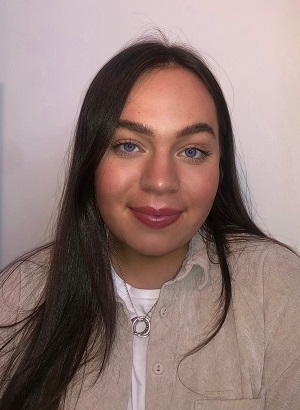
What inspired you to study the MSc Diplomacy and International Security?
I previously completed my undergraduate degree at Strathclyde in Law, Politics and International Relations and saw a lot of advertisements for the new course, which sparked my interest! I was really interested in areas of internationalism, human rights and global politics. I saw Scotland becoming more vocal and aware of its international position, through human rights movements and trade talks and felt a lack of upcoming Scottish academics who could give a Scottish-specific approach to the international sphere. I thought this course was the perfect way to learn about Diplomacy and International Security as a topic which is critically important and crucially relevant.
What do you enjoy most about your course?
I really enjoyed the opportunity in DIS to carve my own multidisciplinary path. My cohort were encouraged to pursue courses across history, law and politics and to discover our own areas of interest and speciality. I found that this to be a unique approach to learning, which led to my classmates covering a variety of timelines and topics of expertise. Coming from a background in Law, Politics and International Relations Joint Hons at Strathclyde, I was able to really delve into the human rights side of DIS, exploring electives in law and politics, and relating them to our core education in the Diplomacy classes.
What specialist knowledge have you developed whilst studying the course?
The DIS course has allowed me to develop an area of specialism which is informed by the history of Diplomacy and applied to current questions about the future of global and national politics. I have developed a key understanding of diplomatic traditions, about the importance of cultural sensitivities and about the key skills of negotiation and collaborative working. These have equipped me for a number of professional endeavours beyond the course.
What do you think of the support available?
The entirety of the DIS teaching team offered a really great support system which was collaborative and responsive to us as students, particularly relevant during the onset of the COVID-19 Pandemic. The team routinely checked in on us while working from home, offered personal calls and were really responsive to individual learning needs during the transition from everyday teaching on campus, to students suddenly facing writing entire dissertations from home, without library facilities. I really valued being able to contribute my opinions to the learning style of the course, coursework and any adaptions required based on our individual circumstances. Overall, I felt really supported to achieve the best I could!
What advice would you give to a prospective student coming to study your course?
I would say never be afraid to get to know your classmates! Many of you will come from different personal and educational backgrounds - use this to your advantage! In my cohort, our best learning and debates came from differences in areas of expertise and bringing in learning from our elective classes and personal areas of interests to the core diplomatic debates we had in class. Your classmates will be your biggest support mechanism. Help each other out, pursue group learning and work together as much as possible. Also, never stop reading!
What are your ambitions for the future and how do you think your time at Strathclyde will help you achieve your goals?
In the future, I hope to pursue a career working in the application of international human rights. My time at Strathclyde has led me to key opportunities which have ignited the start of this career, through HASS faculty opportunities and the support system of the DIS staff. I have since become involved in Youth Diplomacy, working on the Design Working Group of the Y7 Summit 2021 in London, the youth equivalent of the G7 Summit. I have also continued to work within the Strathclyde HASS faculty with the Institute for Inspiring Children’s Futures – working on a number of projects centred around children’s wellbeing and rights, particularly for children facing adversity.